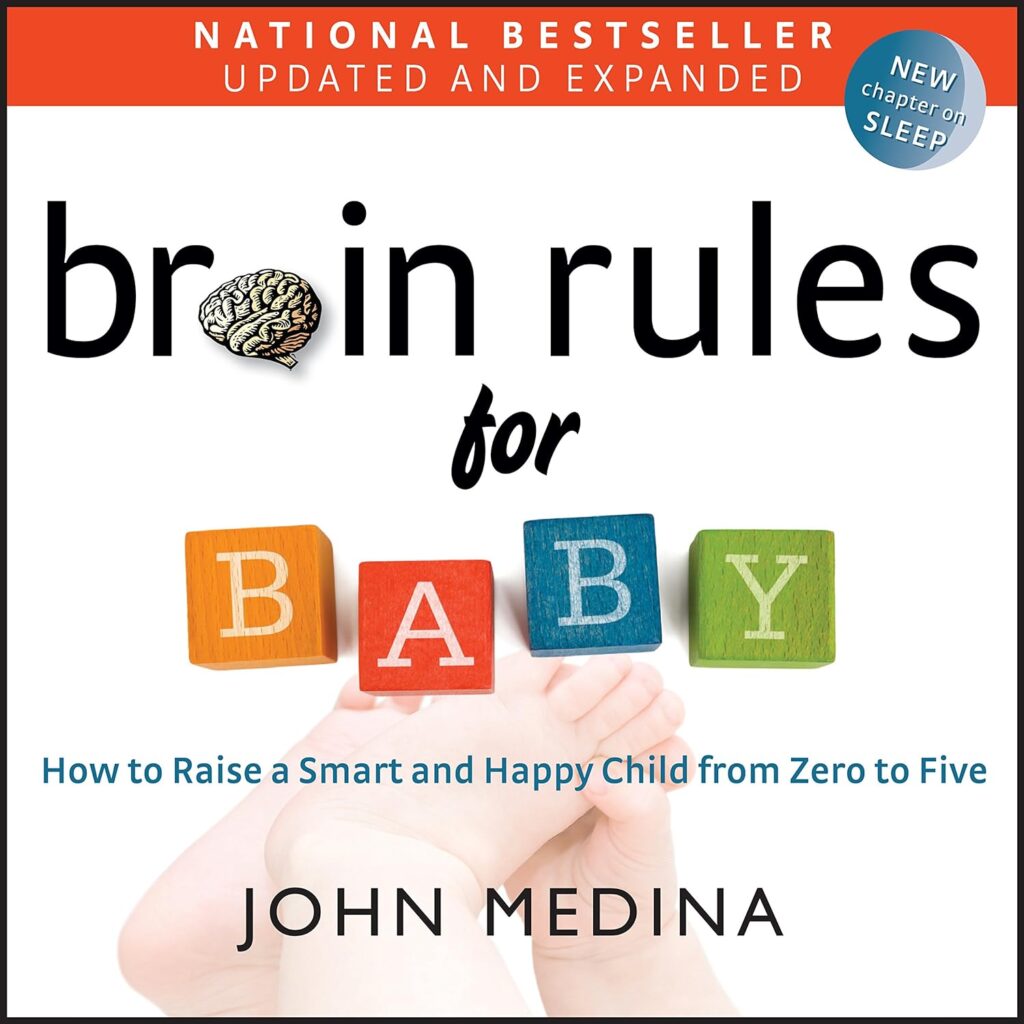Parenting, right from the moment you find out you’re expecting, is a whirlwind of emotions, advice, and a constant stream of questions. How do I raise a child who is both smart and happy? Is there a way to set them up for success from the very start? These were some of the thoughts running through my head as I prepared to become a parent. That’s when I stumbled upon Brain Rules for Baby by Dr. John Medina, a book that promised to answer these exact questions.
Now, I’m not one to jump at every piece of parenting advice out there, but this book intrigued me. It didn’t just offer general guidance; it dove deep into the science behind raising a well-rounded child from zero to five years old. What I found within its pages was both enlightening and practical—an approach to parenting that’s rooted in research but still easy to understand and apply. Let me take you through some of the key insights I gained from this gem of a book.
1. The Power of Connection: Why Love Matters More Than IQ
One of the most striking things I learned from Brain Rules for Baby is that emotional intelligence (EQ) trumps IQ in the early years. Sure, we all want our kids to be smart, but according to Dr. Medina, it’s the emotional connection we establish with our children that lays the groundwork for their future intelligence.
Think about it—when a child feels loved and secure, they’re more likely to explore the world around them, take risks, and learn new things. This emotional safety net gives them the confidence to grow and develop their cognitive skills. It’s not just about showering them with affection (though that’s important too), but also about being present, responsive, and empathetic.
I remember reading about the importance of something as simple as eye contact and how it can strengthen the bond between a parent and child. It’s fascinating how these small, everyday interactions can have such a profound impact on a child’s development. It made me realize that raising a smart child starts with something as basic, yet powerful, as love.

2. The Science of Play: Why Free Time is Crucial
Another eye-opener for me was the chapter on play. We often hear that play is essential for kids, but Brain Rules for Baby breaks down exactly why it’s so crucial. Play isn’t just about having fun; it’s a vital component of brain development.
Dr. Medina explains that when kids engage in unstructured play, they’re actually honing their problem-solving skills, learning to navigate social interactions, and even developing their creativity. What’s more, playtime gives children the freedom to experiment, make mistakes, and learn from them—a process that’s essential for cognitive growth.
I started to see playtime in a new light. It’s not about keeping the kids busy or entertained, but about giving them the space to grow their brains. Whether it’s building a tower of blocks, pretending to be a superhero, or even just running around the yard, these activities are building their brains in ways that formal education just can’t replicate at this stage.
3. The Impact of Stress: Protecting Your Child’s Developing Brain
We all know that stress isn’t good for anyone, but Brain Rules for Baby really drives home how damaging it can be for young children. Dr. Medina talks about how prolonged exposure to stress can have a lasting impact on a child’s brain development, affecting everything from memory to emotional regulation.
This was a wake-up call for me. I realized that creating a calm, stable environment isn’t just about keeping the peace at home—it’s about safeguarding my child’s mental and emotional health. Dr. Medina suggests simple ways to reduce stress, like maintaining a routine, being mindful of your own stress levels, and making sure your child feels safe and supported.
But what I found most helpful was the advice on managing my own stress. Let’s face it, parenting can be overwhelming, and it’s easy to let that stress spill over into your interactions with your child. By learning to manage my own stress, I can create a more peaceful environment for my little one, which in turn, helps them thrive.
4. The Myth of Multitasking: Why Focus is the Key to Success
In today’s fast-paced world, multitasking has become the norm. But here’s the thing—multitasking is a myth, especially when it comes to parenting. According to Brain Rules for Baby, trying to do too many things at once can actually hinder your child’s development.
Dr. Medina explains that the brain isn’t wired to handle multiple tasks simultaneously. When we try to juggle too much, we end up doing everything poorly. This applies to our children as well. When they’re bombarded with too many activities, stimuli, or even screens, it can overload their developing brains.
This section of the book really hit home for me. I realized that being present and focused during my interactions with my child was far more valuable than trying to multitask. It’s not about doing more, but about doing what matters most—spending quality, focused time with my child. Whether it’s reading a book together, having a conversation, or even just playing, being fully engaged is what really counts.
5. The Secret to Raising a Happy Child: It’s Simpler Than You Think
The final takeaway that I want to share is one of the most reassuring. Brain Rules for Baby emphasizes that raising a happy child doesn’t require expensive toys, elaborate educational programs, or even a perfectly calm household. The secret to raising a happy child is much simpler—love, play, and a stress-free environment.
What a relief, right? In a world where we’re constantly bombarded with messages about what we should be doing as parents, it’s refreshing to know that the basics are what really matter. It’s not about being perfect; it’s about being present, responsive, and loving.
This doesn’t mean that parenting is easy—it’s not. But it does mean that we can give ourselves a break and focus on what truly matters. Our children don’t need us to be perfect; they need us to be there, to listen, to play, and to love them unconditionally.
As I reflect on all that I’ve learned from Brain Rules for Baby, I can’t help but wonder—how can we, as parents, continue to simplify our approach to raising our children? How can we strip away the noise and focus on the things that truly make a difference in their lives?
6. Related Articles
You may also find the following article helpful:




